PORTLAND, Ore. (KOIN) — Is Portland city government working when windows and doorways are still boarded up in the heart of the city? When familiar landmarks are gone? When public spaces are fenced off?
Is Portland working when a homeless problem that was bad is now worse, with tents and camps spreading into neighborhoods? Is city government working when piles of trash and filth have become a normal part of the city’s landscape?
“It seems like the city is doing nothing. They wring their hands and occasionally they say, ‘This is terrible.’ Its not acceptable for Portland,” said resident David Potts. “They don’t do anything. They’re too busy fighting with one another about whose bureau is going to be taken care of better.”
“I don’t think I could describe it,” Todd Littlefield said. “My unsatisfaction, lack of response, lack of accountability. Unsafe neighborhoods. We need help.”
“When I emailed city council, there’s no response,” Char Penny said. “None.”
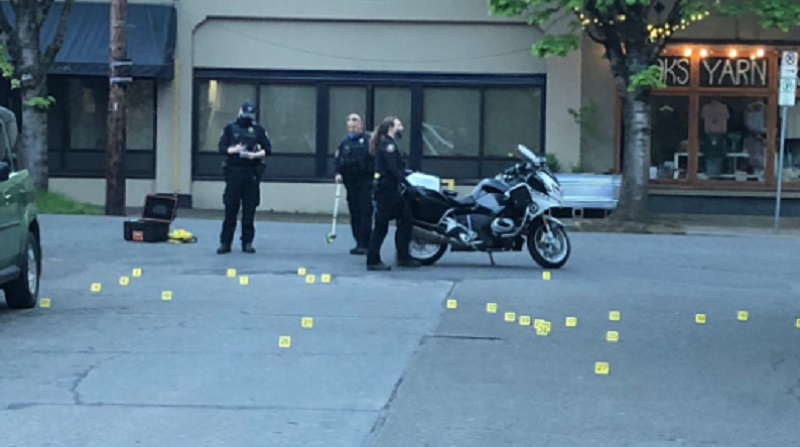
And when gun violence exploded across Portland in Summer 2021, how did City Hall respond? The Portland City Council cancelled 2 of their August meetings because there weren’t enough commissioners for a quorum.
“I think it’s kind of almost a blame game. They’re afraid to do anything different for fear that, you know, they’ll be blamed that didn’t work out,” said Juanita Sweetwood. “I don’t think this form of government is working for Portland, for this population.”
‘We really have 5 mayors’
When it comes to how a city is run, urban experts say Portland has one of the most unaccountable, inefficient, outdated forms of government compared to any other major city in the United States.
“I will tell you, it’s even worse than that,” City Commissioner Mingus Mapps said. “Portland’s form of government is inexcusable.”
“I don’t think this form of government is working for Portland, for this population.”
–Juanita Sweetwood
“Portland’s form of government is inexcusable.”
— Commissioner Mingus Mapps
Mapps, in his first term as a city commissioner, was elected to serve the people. But that’s hard to do under Portland’s commission form of government.
“Probably most Portlanders think we have a mayor and 4 members of the city council, but that’s not how things really work here in Portland,” Mapps told KOIN 6 News. “We really have 5 mayors each in charge of his or her own fiefdoms.”
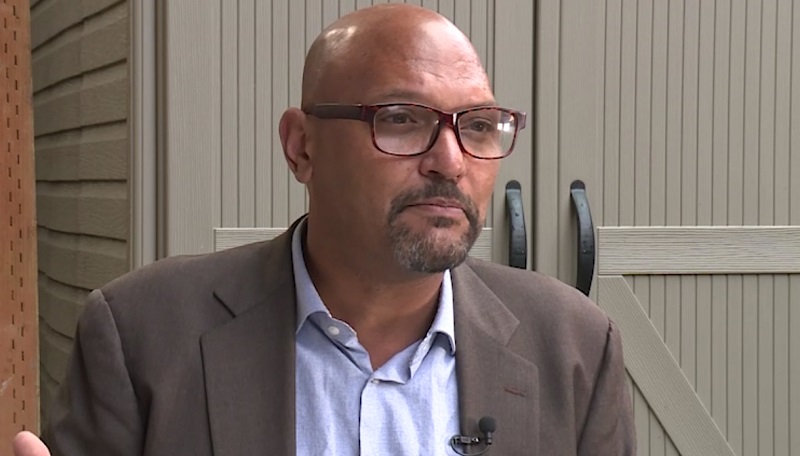
Those fiefdoms are the city bureaus: Fire, police, water, parks and recreation, housing, environmental services. The list goes on. Each commissioner is assigned their collection of bureaus and offices to oversee, responsible for hundreds of employees, multi-million dollar budgets, labor agreements, strategic plans, day-to-day operations.
It’s not a good way to run a city.
Nearly 3 years ago, Mayor Ted Wheeler was blunt about why commissioners — including himself — should not be managing bureaus: that’s not why the people elected them.
“We sort of have the worst of both worlds through this commission form of government because we ask people who are running — often as community activists — to become managers of enterprises and they typically don’t have that level of experience,” Wheeler said in early 2019. “They’re not really doing the kind of things you want them to be doing at City Hall, which is representing you and speaking for you.”
‘Not a single accountable person in charge’
Not speaking for the citizens of Portland is one thing. But Portland city bureaus often don’t speak with each other, don’t cooperate or share data and information. It’s a recipe for disaster when you’re trying to solve some of the city’s toughest problems, such as the thousands of people living on our streets.
For the past 7 years, Mary Hull Caballero has worked as the Portland City Auditor. She said the weakness of Portland’s commission form of government was exposed during the last 2 years as the city faced crisis after crisis.
“You can look around and see the difficulty we’re having with houseless Portlanders. They need a variety of services. The city has several bureaus working on that issue. Yet you don’t have a single accountable person in charge of solving the problem,” Caballero told KOIN 6 News.
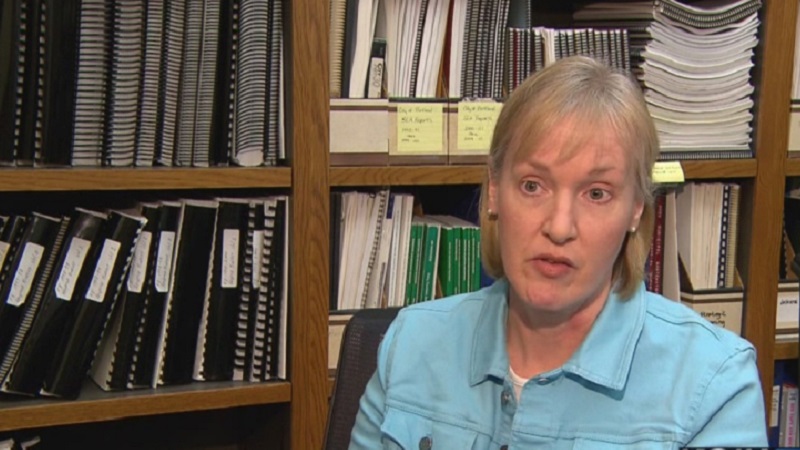
“Right now there are 3 different commissioners who have a hand in the various bureaus that need to come together to provide public safety for Portland,” she said. “If you can’t get all 3 commissioners on board to push in the same direction, then it really falls down.”
And it has fallen down. The lack of accountability has taken a toll. The commission form of government is really a committee.
“The city is run by a committee, and it’s a committee of 5,” Caballero said. “Those 5 people often have very different agendas that they’re trying to accomplish. If you have 5 people in charge, no one is really in charge. That’s where the accountability falls down.”
‘District representation would be huge’
The lack of accountability starts with the way Portland votes for city commissioners. In Portland, the commissioners are elected citywide. In almost every other major American city, they’re elected by districts.
Imagine if Portland was divided into geographic districts with each commissioner living in and elected by the people in that district. Your commissioner would know the people and the neighborhoods. They would see problems firsthand, go to neighborhood meetings, actually listen and respond, speak for you at City Hall.
That’s not what happens now.
“In my opinion having somebody who doesn’t even live in your neighborhood try to speak for your neighborhood is kind of absurd,” said Grant Williams. “To have district represenation would make a huge difference.”
“The current form of government is fine if you live in the West Hills,” Potts said. “It’s terrible for East Portland We really have no representation here.”
In many East Portland neighborhoods there are miles of unpaved gravel streets. Pleas from neighbors to fix the roads in front of their home have been ignored for years. Many who live here feel the city doesn’t care.
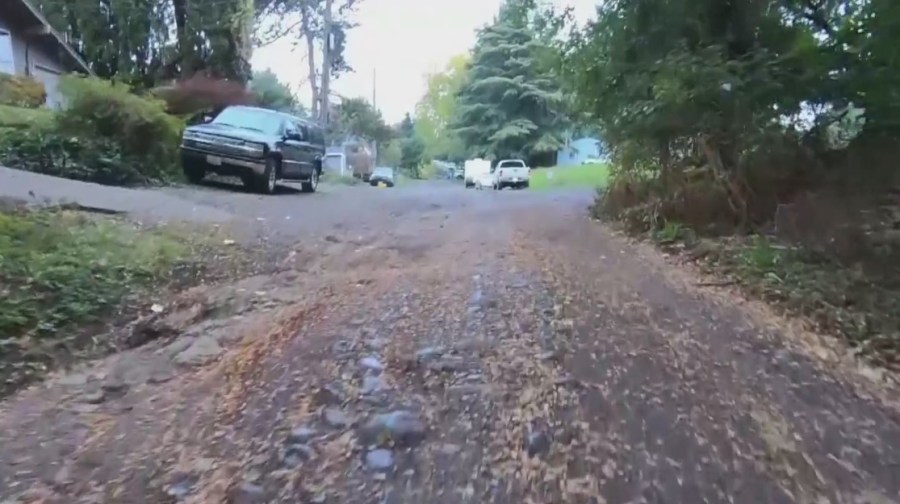
“We need representation for Southeast Portland,” Char Penny said. “Right now each commissioner handles, as you know, a bureau. So we don’t have any representation.”
Todd Littlefield said he’s lived all over Portland. “I’ve lived in Portland 47 of the last 51 years and what’s being tolerated in Southeast Portland would not be tolerated. And other areas of Portland I’ve lived it would not be tolerated.”
Maricruz Factor and her husband have repeatedly asked the city for help with cleaning up the mountains of trash from a nearby homeless camp. There are used needles on the ground. There’s been gunfire from the camps.
They’ve gotten no response.
“I would actually like to see them doing something about it and caring, you know, for us and our safety of our kids who live around here,” Factor said. “My husband has been calling so many times the city to pick up the trash because there’s so many rats in our neighborhood. We’re trying to control it. We can’t because there’s just too many trash.”
And when commissioner are invited to a neighborhood meeting to discuss concerns, they rarely respond or show up.
“Frankly, as you get away from the center of the city, as you get out to East Portland, for example, a lot of those folks feel like elected officials just don’t understand the challenges they live with,” Mapps said. “And as someone who used to work in Parkrose, I say that is true.”
He’s aware he’s one of the few African Americans ever to serve on the Portland City Council. “So there’s that kind of diversity,” he said. “But even more rare kind of diversity is having someone in council who lives east of 82nd. It’s about time we have more folks like that.”
It’s not just East Portland. The frustration is echoed in neighborhoods across the city.
Steve Kanter is the former dean of the Lewis & Clark Law School. He lives in Northwest Portland and pointed to the intersection of NW 22nd and Hoyt where gunfire erupted last July. Police believe rival gang members opened fire, with bullets striking cars and nearby homes.
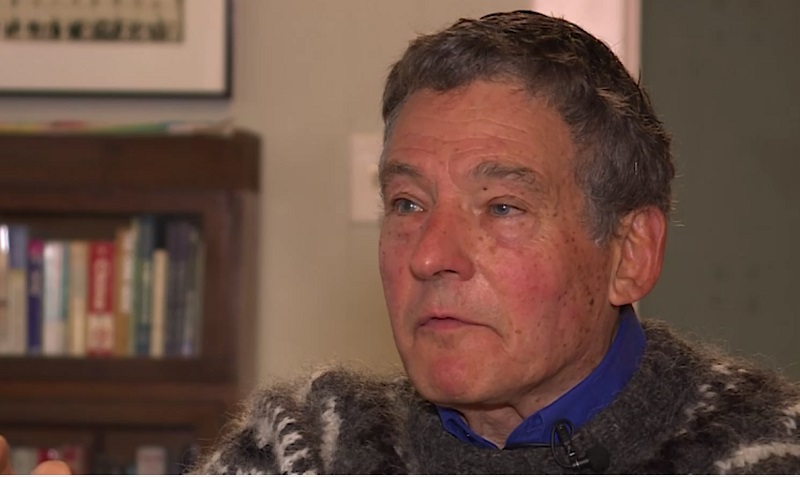
“It was 2 cars with high caliber ammunition firing at each other and hitting other cars,” Kanter told KOIN 6 News. “The police said it was high caliber ammunition that can penetrate metal of cars. You know, it could have penetrated somebody’s wall and killed somebody going through a window.”
Investigators recovered 28 bullet casings. In the days that followed, one of Kanter’s friends wanted someone from City Hall to come to a neighborhood meeting.
“He called many times. Never got a call back,” Kanter said. “Which is just appalling.”
Resident Parker Fitzgerald said it appears “the attitude from the city seems to be, like, ‘We don’t care if you leave because if you leave somebody from San Francisco is going to come and buy your house anyway and we’re still going to get our tax money from them. So who cares what you think? If you don’t like it, if you don’t like it you can go to Montana or Florida or wherever the heck you want to go.'”
Portland Charter Commission in progress
But there is a renewed effort to change Portland’s form of government.
For the last several months the Portland Charter Commission has been meeting, taking public input and ideas, with the goal of putting the question of changing Portland’s form of government on the November 2022 ballot.
Mapps has formed a political action committee with a lot of community support raising money to make Portlanders aware why it’s important to vote for change. He’s open to whatever ideas on government the charter commission proposes but said district representation is the key.
“I’m trying to organize people to come together and help push that initiative forward. We need to get organized now so we can win again in November of 2022,” Mapps said. “I would like to see council members elected by districts. I think that’s a great idea. The one thing I hear is everyday hear the voices of Portlanders who feel they’re not being heard at City Hall.”
City Auditor Mary Hull Caballero agrees. The city’s commission form of government takes away your voice at City Hall.
“It leaves the commissioners in charge really representing their bureaus and the people who work for those bureaus more than the people who live in this town,” Caballero said. “I think that is a fatal flaw of the way we do business in Portland.”
“I am convinced that one of the most important things we can do to turn the city around is to change our form of government,” Mapps said. “Our commission form of government is just untenable. If we don’t change that our city is going to fail.”